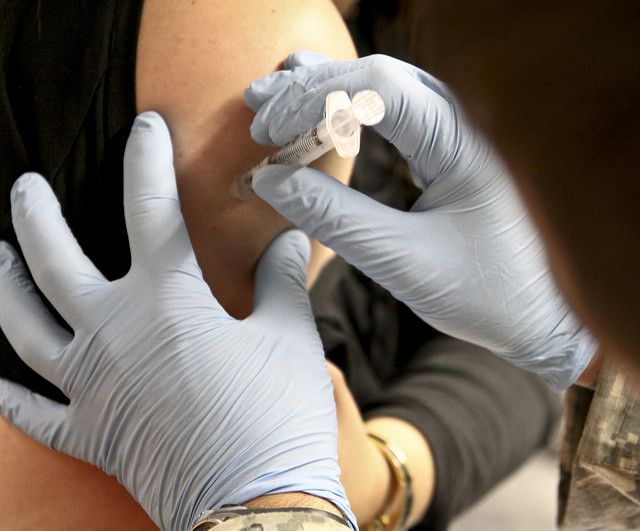
It’s Beginning to Feel a Lot Like Flu Season
Part 2: Recommendations, Symptoms, Where to Go
By Bonita Banks, BSN, RN
Health & Wellness Educator for South Peninsula Hospital
In the United States, influenza and its complications are the most frequent cause of death from a vaccine-preventable disease. This contagious respiratory illness effects the nose, throat and lungs. The estimated effectiveness of the flu vaccine depends on many factors, such as the health and age of the person receiving the vaccine, the accuracy of the strains of viruses used in the vaccine and any mutations that may have developed, the type of study done to evaluate effectiveness, and how the outcomes are measured. However, the Centers for Disease Control and Prevention (CDC) and the World Health Organization (WHO) agree the most effective way to prevent severe outcomes from influenza viruses is through vaccination.
2016-2017 Flu Season CDC Recommendations
According to the CDC, it is recommended that everyone aged 6 months or older who do not have contraindications receive a routine annual influenza vaccine. The American Academy of Pediatrics agrees with this recommendation, noting that children under the age of 2 are at particular risk for complications and hospitalization from the flu.
Having a previous severe allergic reaction to a flu vaccine would be a contraindication to getting the vaccine. CDC recommendations have changed for those who have a history of egg allergies, and these individuals may receive the vaccine depending on the severity of the reaction. This should be reviewed with your health care provider before making the decision to get the flu vaccine.
Use of the LAIV nasal spray vaccine is not recommended by the CDC for this flu season. This decision was based on poor effectiveness of the LAIV against H1N1 viruses in the 2013-2014 flu season, and during the 2014-2015 season there was a lack of evidence it provided better protection against H3N2 than did the inactivated influenza vaccine (IIV).
The seasonal influenza vaccination is recommended by WHO for:
- Highest priority
- Pregnant women
- Priority (in no particular order):
- Children aged 6-59 months
- Elderly
- Individuals with specific chronic medical conditions
- Health-care workers
Flu or Cold?
Different viruses are responsible for the cold and the flu, but they are both respiratory illnesses with similar symptoms. Someone with a cold will in general have milder symptoms and experience more of a stuffy, runny nose. Many people believe the distinction in symptoms is that a fever will be present with the flu, but that is not always the case. The flu can present with some or all of the following symptoms:
- Fever or feeling feverish/chills
- Cough
- Sore throat
- Runny or stuffy nose
- Muscle or body aches
- Headaches
- Fatigue (very tired)
- Some people may have vomiting and diarrhea (more common in children)
Mild complications from the flu include sinus and ear infections, with more serious complications being pneumonia and an increased risk for bacterial infections in the lungs, heart, muscle and brain. A cold will generally not develop into more serious illnesses.
Contagious Virus
Influenza is primarily spread person to person by droplet, which means when someone with the flu coughs, sneezes or talks, the droplets can land in someone’s nose or mouth up to 6 feet away. It is possible to touch droplets that have fallen on a surface and then become infected by touching your hand to your mouth or nose. Handwashing and cleaning surfaces are two important ways to help combat the spread of the virus.
The virus can be being spread to others a day before symptoms are even experienced, and continue to be spread 5-7 days after becoming sick. Symptoms generally start to appear 1-4 days after being infected. Being able to spread the virus before knowing you are sick makes it especially difficult to prevent infecting others, which is one reason the flu vaccine can be so valuable.
Mercury in flu vaccine?
In multi-dose vials of influenza vaccine, a small amount of ethyl mercury compound (theomerosal) may be used as a preservative. This is different from methyl mercury, found in certain types of fish and which has been linked to nervous system damage and should be avoided by women who are pregnant. There is no theomerosal in single dose vials or pre-filled syringes. The list of trade names and theomerosal content can be found here.
Where to get the influenza vaccine locally
Flu season peaks December through March, so you still have plenty of time to get vaccinated! Here are places to go in Homer:
Homer Medical Center:
Private insurance, Medicare and Medicaid accepted and all cover the vaccine 100%. For self-pay, there is a $27 charge to administer the free vaccine.
Hours: M-F 8:30am-5:00pm; Tuesday and Thursday walk-in hours from 5:30pm – 8:00pm and Saturday 10:00am – 5:00pm.
Make an appointment or stop in to receive the vaccine. 907-235-8586
Homer Public Health:
Flu vaccines are available by sliding scale $0-$27.40 based on income; no one is turned away for lack of funds.
Appointments are available on Tuesdays and Thursdays 8:30am – 5:00 pm. Call 907-235-8857. Please note: Due to state budget reductions, immunizations are only available for people ages 6 months to 29 years old.
SVT Health & Wellness:
For established patients, vaccines are available by appointment. For new patients, appointments can be made to be seen by a provider and get the flu vaccine. Private insurance, Medicare and Medicaid accepted. Self pay is by sliding scale. Call 907-226-2228.
Hours of operation: M 9:00a – 7:00p, T 9:00a – 5:00p, W 11:00a – 5:00p, Th 9:00a – 5:00p, F 9:00a – 5:00p
References:
- Image: U.S. Army Corps of Engineers Europe District – Flu vaccinations make their way to U.S. Army in Europe
- CDC – Influenza
- WHO- Influenza
- AAP – What’s the Latest with the Flu?
- CDC – Prevention and Control of Seasonal Influenza with Vaccines
- Live Science – 6 Flu Vaccine Myths
